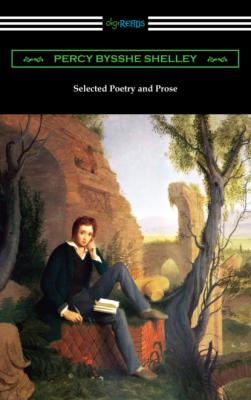Selected Poetry and Prose. Percy Bysshe Shelley
Чтение книги онлайн.
Читать онлайн книгу Selected Poetry and Prose - Percy Bysshe Shelley страница 19
 stagnate night:—till the minutest ray
stagnate night:—till the minutest ray
Was quenched, the pulse yet lingered in his heart.
It paused—it fluttered. But when heaven remained
Utterly black, the murky shades involved
An image silent, cold, and motionless,
As their own voiceless earth and vacant air.
Even as a vapor fed with golden beams
That ministered on sunlight, ere the west
Eclipses it, was now that wondrous frame—
No sense, no motion, no divinity—
A fragile lute, on whose harmonious strings
The breath of heaven did wander—a bright stream
Once fed with many-voiced waves—a dream
Of youth, which night and time have quenched forever—
Still, dark, and dry, and unremembered now.
Oh, for Medea’s wondrous alchemy,
Which wheresoe’er it fell made the earth gleam
With bright flowers, and the wintry boughs exhale
From vernal blooms fresh fragrance! Oh, that God,
Profuse of poisons, would concede the chalice
Which but one living man has drained, who now,
Vessel of deathless wrath, a slave that feels
No proud exemption in the blighting curse
He bears, over the world wanders forever,
Lone as incarnate death! Oh, that the dream
Of dark magician in his visioned cave,
Raking the cinders of a crucible
For life and power, even when his feeble hand
Shakes in its last decay, were the true law
Of this so lovely world! But thou art fled,
Like some frail exhalation, which the dawn
Robes in its golden beams,—ah! thou hast fled!
The brave, the gentle and the beautiful,
The child of grace and genius. Heartless things
Are done and said i’ the world, and many worms
And beasts and men live on, and mighty Earth
From sea and mountain, city and wilderness,
In vesper low or joyous orison,
Lifts still its solemn voice:—but thou art fled—
Thou canst no longer know or love the shapes
Of this phantasmal scene, who have to thee
Been purest ministers, who are, alas!
Now thou art not! Upon those pallid lips
So sweet even in their silence, on those eyes
That image sleep in death, upon that form
Yet safe from the worm’s outrage, let no tear
Be shed—not even in thought. Nor, when those hues
Are gone, and those divinest lineaments,
Worn by the senseless wind, shall live alone
In the frail pauses of this simple strain,
Let not high verse, mourning the memory
Of that which is no more, or painting’s woe
Or sculpture, speak in feeble imagery
Their own cold powers. Art and eloquence,
And all the shows o’ the world, are frail and vain
To weep a loss that turns their lights to shade.
It is a woe “too deep for tears,” when all
Is reft at once, when some surpassing Spirit,
Whose light adorned the world around it, leaves
Those who remain behind, not sobs or groans,
The passionate tumult of a clinging hope;
But pale despair and cold tranquillity,
Nature’s vast frame, the web of human things,
Birth and the grave, that are not as they were.
AN EXHORTATION
Chameleons feed on light and air:
Poets’ food is love and fame:
If in this wide world of care
Poets could but find the same
With as little toil as they,
Would they ever change their hue
As the light chameleons do,
Suiting it to every ray
Twenty times a day?
Poets are on this cold earth,
As chameleons might be,
Hidden from their early birth
In a cave beneath the sea;
Where light is, chameleons change:
Where love is not, poets do:
Fame is love disguised: if few
Find either, never think it strange
That poets range.
Yet dare not stain with wealth or power
A poet’s free and heavenly mind:
If bright chameleons should devour
Any food but beams and wind,
They would grow as earthly soon
As their brother lizards are.